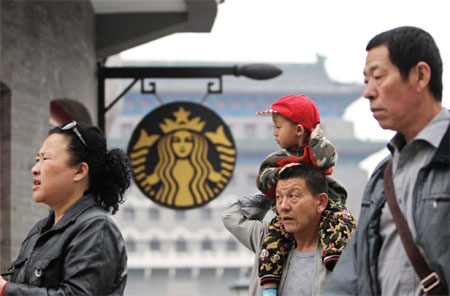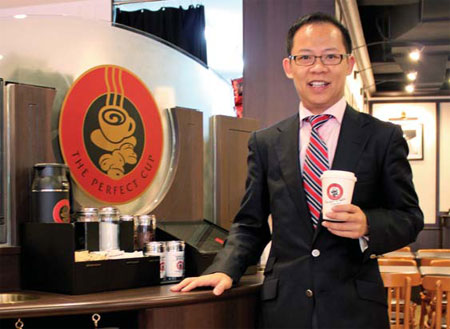Coffee break in tradition
Updated: 2012-10-12 10:02
By Lu Chang (China Daily)
|
|||||||||||
|
A Starbucks sign is seen in Qianmen, Beijing. The increasing interest of the Chinese consumers for coffee has created huge opportunities for coffee chains and equipment makers. Jason Lee / Reuters |
|
Raymond Tong says that in China, coffee is more like a symbol of Western affluence and a social trend. Provided to China Daily |
At home and in cafes, China is waking up and smelling the coffee
When Diego Panucci left home for his first trip to China in 2000, there was one very important thing he forgot in his weeks of preparation - his coffee maker. The young Italian, who came to study Chinese, was facing a year without caffeine as precious few coffee shops existed in China back then, when the growing middle classes had yet to begin developing a taste for arabica and robusta beans.
"It was really killing me, and when I told the taxi driver to find a cafe, he didn't have the faintest idea what I was talking about," says Panucci, who can't begin a day without having his espresso. "I found instant coffee instead. It wasn't espresso but it was better than nothing."
But more than a decade later, with the strong forces of international companies such as Starbucks, Costa Coffee and Nestle laying the groundwork, change is brewing in China.
And Panucci no longer frets about his caffeine hits when he frequently visits the country through his job in event management.
From the proliferating coffee shops in the big cities to the coffee machines slowly infiltrating households, the home of tea is rapidly giving way to java, mocha, latte and the like.
| ||||
"Currently the average coffee consumption in China stands at a mere three cups per person per year, while that figure rises to 240 cups for the world's average," says Ji Ming, chief of the Beijing Coffee Industry Association. "Therefore, there's a lot of growth potential in China's coffee market."
Analysts cite Japan where love of tea runs just as deep as in China, but with promotion of coffee, its per capita annual coffee consumption has already hit 300 cups, well above the global average.
"With the current growth rate, it is only a matter of time before China zooms past Japan as the second-largest coffee consumer in the world," Ji says.
However, compared with Japan, coffee drinking in China is more about seeking a Western lifestyle or is a social trend for many young urbanites, rather than a habit.
"In China, coffee is more like a symbol of Western affluence, friendship and a bridge in connecting the people," says Raymond Tong, CEO of Pacific Coffee, the second-largest coffee chain in Hong Kong after Starbucks, and now owned by the State-backed China Resources Vanguard.
"More and more people are embracing the practice of meeting over coffee, and group networking at coffee shops to discuss business or simply for pleasure," he says.
Huang Long, the 38-year-old owner of an IT company in Beijing, says he doesn't drink coffee when he visits a coffee shop as he hasn't got used to its bitterness. But he comes to Starbucks at least four times a week to surf the Internet or meet with friends.
"I like the environment of the coffee house," he says. "It is a relaxing place to chat, hang out, and even to work.
"Besides, sitting around a coffee house with a mug in hand is just a new lifestyle affectation."
Sentiments like these are exactly what coffee promoters like to hear, and explain why a wide array of companies are speeding up expansion to win a decent slice of China's coffee pie.
Currently, Seattle-based Starbucks operates more than 650 stores across 51 Chinese cities and takes the lion's share in the market of specialty coffee shops - more than half in terms of revenue, according to a Euromonitor research report in 2011 - and it plans to increase the number to 1,500 stores, across more than 70 cities and triple the number of employees to 30,000 by 2015.
"We have an extremely ambitious development plan in China," says Belinda Wong, president of Starbucks China. "China has been designated as our second home market outside of the United States. We believe China will become our largest market outside of the US by 2014."
As a latecomer to China's market, Pacific Coffee has made up ground quickly with an even more aggressive expansion plan, after selling 80 percent of its stake to CRV, one of China's largest retail chain enterprises.
The company now has about 100 stores in China and plans to have more than 1,000 within the next five to eight years.
"Starbucks has pioneered the development of the American-style coffee chains in China. Costa Coffee serves coffee in a typical European style, but as a Hong Kong-based coffee house, we are more localized, a combination of both western and Chinese elements, with red cozy sofas, red blooming-lotus chandeliers and dark wood decoration," says Tong from Pacific Coffee.
To add more Chinese flavor, Tong says, Pacific has introduced Huadiao mocha, which combines a Chinese yellow wine with a mocha blend, and Erguotou chillino, iced coffee mixed with white spirits that has an alcohol level of more than 50 percent.
"We don't have a rigid format and try to be a bit more flexible and creative in our products to suit the Chinese taste," he says.
London-based research firm Euromonitor International estimates the total turnover of China's market for coffee shops hit 3.5 billion yuan last year and projects it will triple to about 10 billion yuan by 2016.
However, expanding in China means reaching out beyond the country's big cities, and the hefty cost of a cup of coffee may deter customers in third or fourth-tier cities.
"Starbucks itself has been grappling with the high price of coffee, which is roughly in line with that in the United States," says Stacy Wan, an analyst with Euromonitor. "Some customers might shy away from it.
"But the top concern for most coffee shops remains rising operation costs. Skyrocketing rent and labor costs may keep those big coffee chains from protecting margins."
The fierce competition among coffee shops has also created a demand for thousands of baristas, resulting in the rise of specialist training schools.
Qi Ming, a 33-year-old coffee bar owner and principal of Blend Coffee College in Beijing, says his organization has trained hundreds of baristas in the past year for the likes of Starbucks and Costa Coffee .
"Owning a coffee shop is not only an attractive business proposition, but also a dream for many Chinese urbanites, who expect to be educated on how to be a professional barista and how to run a coffee shop," he says. "To cater to them, we provide a series of bean-to-cup classes and cafe management courses."
Qi says, as a member of the Specialty Coffee Association of Europe and the US, the college hopes to double the number of barista students from 400 to 800 next year.
While coffee shops are pricey options for some Chinese, and instant coffee is generally the order of the day, coffee machines are becoming an increasing presence in Chinese kitchens.
"Many educated Chinese consumers and those who are well-traveled, now have sophisticated tastes," says Mark Sng, Electrolux's trade marketing manager for Asia-Pacific, Middle East and Africa. "They do not drink instant coffee or packaged coffee beverages but now purchase single-origin coffee beans or sophisticated flavored coffee, and choose to brew their own coffee."
The Swedish company offers a wide range of products costing from 208 yuan ($33, 26 euros) for an automatic drip coffee machine to 2,188 yuan for an Italian-style semi-automatic espresso machine.
Since Electrolux coffee machines became available in China in 2006, annual sales have jumped from 10,000 to 300,000 in 2011.
"With Chinese consumers becoming more sophisticated and embracing the taste of freshly brewed coffee, we have seen significant growth in the past five years," says Kelvin Yuen, commercial director of Electrolux (China) home appliances Co Ltd.
Currently, China's coffee machine market is dominated by Electrolux and Dutch group Philips Electronics selling filter-drip machines, while premium-priced semi and fully automatic machines, such as Nestle's Nespresso or from Gaggia in Italy, remain a niche market.
But Yang Haocheng, executive vice-president of Gaggia China in Shanghai, believes that will change.
"Although many Chinese are still unfamiliar with automatic coffee machines, they're learning very fast," he says. "There's a ravenous thirst for coffee that tastes as good at home as outside, and those kinds of machines will eventually become common in homes."
lvchang@chinadaily.com.cn
(China Daily 10/12/2012 page12)
Today's Top News
Rescuers race against time for quake victims
Telecom workers restore links
Coal mine blast kills 18 in Jilin
Intl scholarship puts China on the map
More bird flu patients discharged
Gold loses sheen, but still a safe bet
US 'turns blind eye to human rights'
Telecom workers restore links
Hot Topics
Lunar probe , China growth forecasts, Emission rules get tougher, China seen through 'colored lens', International board,
Editor's Picks

|

|

|

|

|

|









